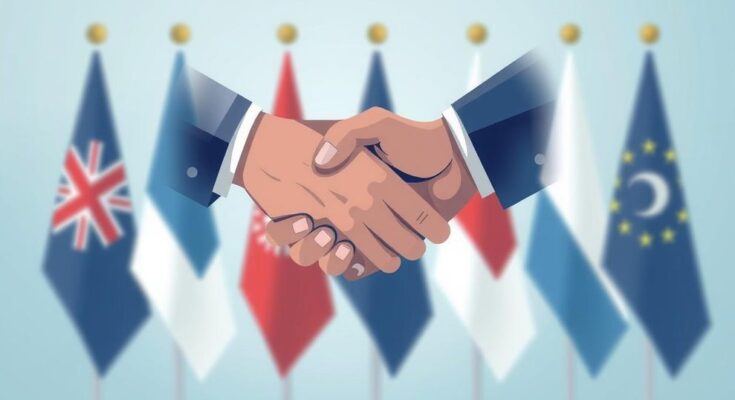Iran denies receiving any message from President Trump regarding nuclear negotiations, with Foreign Minister Araghchi stating that no communication has occurred. Supreme Leader Khamenei rejected Trump’s offer for negotiations, criticizing it as an attempt by powerful nations to impose their agenda on Iran. Iranian officials stress the importance of internal unity amidst external pressures as tensions continue between Tehran and Washington over nuclear activities and sanctions.
Iran has firmly stated that it has not received any correspondence from United States President Donald Trump regarding negotiations about its nuclear program. This assertion was made by Iranian Foreign Minister Abbas Araghchi during a televised meeting with Supreme Leader Ayatollah Ali Khamenei, following Trump’s claim of having sent a message. Araghchi emphasized, “We have heard talk about a message, but we have not received anything so far.”
Furthermore, Araghchi conveyed that Iran is unwilling to engage in direct negotiations with the United States while sanctions remain in effect. He remarked, “We will not enter any direct talks with the U.S. so long as they continue their maximum pressure policy and their threats.” This statement underscores Iran’s stance against negotiating under what it perceives as coercive pressure from the U.S.
Trump purportedly had sent a letter to Khamenei, suggesting negotiations and expressing a desire for an agreement concerning Iran’s nuclear aspirations. However, Iran’s mission to the United Nations refuted Trump’s claims, stating, “No letter has been received,” as reported by Iranian state media when addressed by U.S. outlets.
In response to Trump’s overture, Supreme Leader Khamenei categorically rejected the offer for negotiations, denouncing it as a maneuver by “bullying governments” seeking to impose their will on Iran. During his address, he reaffirmed the nation’s refusal to engage with any countries that wished to dominate or impose their demands, asserting that such endeavors do not resolve underlying issues.
Additionally, Iranian President Masoud Pezeshkian commented on U.S. strategies aimed at undermining Iran’s energy exports and inciting internal discord. He insisted that, “The enemies of Iran place their hope in our internal divisions. If we maintain unity within the country and seize the opportunity to pursue development correctly, no external pressure can hinder our progress.”
As tensions between Tehran and Washington continue to intensify due to Iran’s nuclear activities and U.S. sanctions, diplomatic engagement remains sparse, reflecting the fragile state of international relations between the two nations.
In summary, Iran has dismissed claims made by President Trump regarding a message about nuclear negotiations. Iranian officials asserted their stance against engaging in direct talks with the U.S. amid ongoing sanctions. Furthermore, Supreme Leader Khamenei and President Pezeshkian echoed sentiments of resilience against external pressures and emphasized the importance of domestic unity. Overall, diplomatic relations between the U.S. and Iran remain strained and tenuous.
Original Source: shafaq.com




